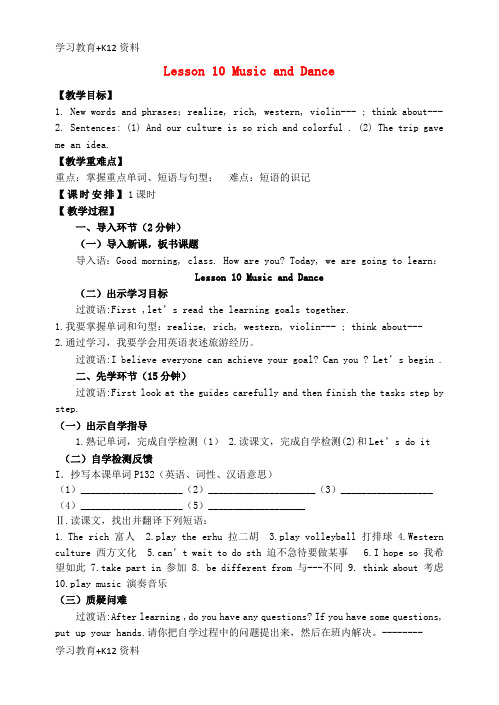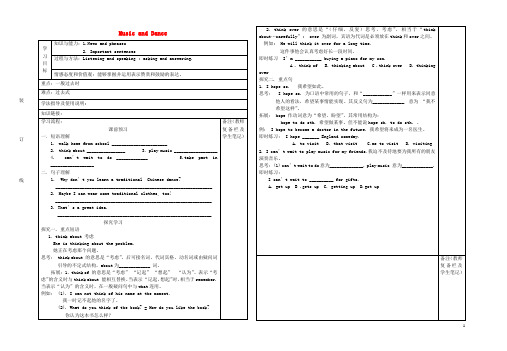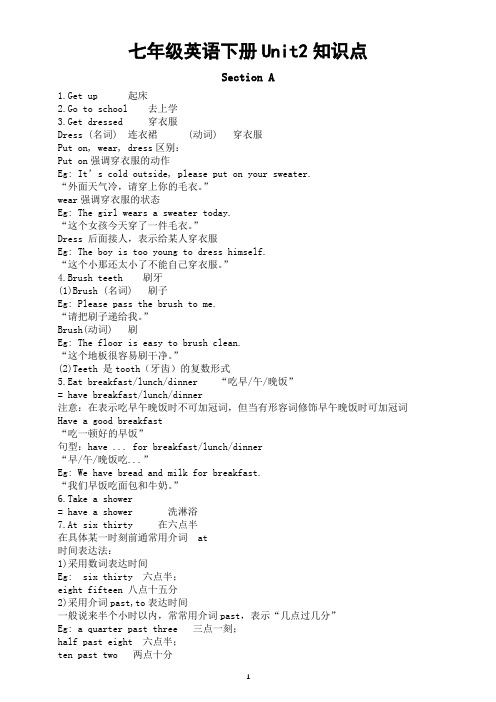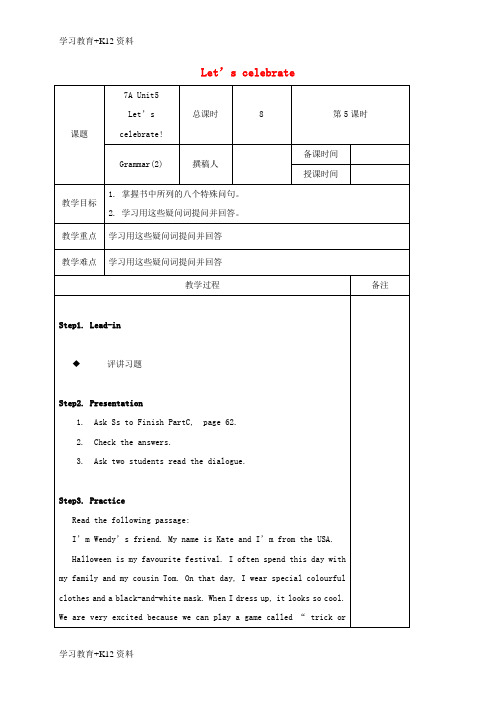【小初高学习]2016-2017学年七年级英语下册 Unit 2 Im going to stud
小初高学习七年级英语下册Unit2It’sShowTimeLesson10MusicandDance

Lesson 10 Music and Dance【教学目标】1.New words and phrases;realize, rich, western, violin--- ; think about---2.Sentences: (1) And our culture is so rich and colorful . (2) The trip gave me an idea.【教学重难点】重点:掌握重点单词、短语与句型;难点:短语的识记【课时安排】1课时【教学过程】一、导入环节(2分钟)(一)导入新课,板书课题导入语:Good morning, class. How are you? Today, we are going to learn:Lesson 10 Music and Dance(二)出示学习目标过渡语:First ,let’s read the learning goals together.1.我要掌握单词和句型:realize, rich, western, violin--- ; think about---2.通过学习,我要学会用英语表述旅游经历。
过渡语:I believe everyone can achieve your goal? Can you ? Let’s begin .二、先学环节(15分钟)过渡语:First look at the guides carefully and then finish the tasks step by step.(一)出示自学指导1.熟记单词,完成自学检测(1)2.读课文,完成自学检测(2)和Let’s do it (二)自学检测反馈I.抄写本课单词P132(英语、词性、汉语意思)(1)____________________(2)_____________________(3)__________________ (4)____________________(5)___________________Ⅱ.读课文,找出并翻译下列短语:1.The rich 富人2.play the erhu 拉二胡3.play volleyball 打排球4.Western culture 西方文化5.can’t wait to do sth 迫不急待要做某事6.I hope so 我希望如此7.take part in 参加8. be different from 与---不同9. think about 考虑10.play music 演奏音乐(三)质疑问难过渡语:After learning ,do you have any questions? If you have some questions, put up your hands.请你把自学过程中的问题提出来,然后在班内解决。
【小初高学习]2016-2017学年七年级英语上册 Unit 4 My day Welcome to
![【小初高学习]2016-2017学年七年级英语上册 Unit 4 My day Welcome to](https://img.taocdn.com/s3/m/b5eabd3890c69ec3d5bb7591.png)
Step4 Presentation ( Part B on P43)
1.Listen to Millie and her Aunt’s conversation and answer: Is Millie often late for school? (No. She isneverlate for school.)
2. Listen to the tape and ask: What does Hobo think of dogs like Eddie?
2. Show different times and say: Look! What time is it? What do you do at this time every day? What do you do after breakfast? Encourage Ss to give their ideas. Present the following words and phrases:have lessons/classes, do after-school activities, do homework, go to bed…
教学难点
Tolearn to describe one’s daily life
教学ห้องสมุดไป่ตู้程
备注
Step 1 Presentation and lead-in
1. T:…, is your home far away from your school? How do you go to school every day? What time do you often get to school every day?
2016年春七年级英语下册Unit2It'sShowTimeLesson10MusicandDanc

I can’t wait to __________ for gifts.
A. get up B .gets up C. getting up D.got up
备注(教师复备栏及学生笔记)
备注(教师复备栏及学生笔记)
3
备注(教师复备栏及学生笔记)
备注(教师复备栏及学生笔记)
装订线
难点:过去式
学法指导及使用说明:
知识链接:
学习流程:
课前预习
一.短语理解
1.walk home from school _______________________
2.think about ________________ 3. play music __________________
4. can’t wait to do _____________ 5.take part in __________________
你认为这本书怎么样?
2. think over的意思是“(仔细,反复)思考,考虑”,相当于“think about…carefully”; over 为副词,宾语为代词是必须放在think和over之间。
例如: He will think it over for a long time.
这件事他会认真考虑好长一段时间。
即时练习I’m ___________ buying a piano for my son.
A . think of B. thinking about C .think over D. thinking over
探究二. 重点句
1. I hope so. 我希望如此。
思考: I hope so. 为口语中常用的句子,和“____________”一样用来表示同意他人的看法,希望某事情能实现。其反义句为_____________, 意为 “我不希望这样”。
初中英语人教版七年级下Unit 2 What time do you go to school知识点

七年级英语下册Unit2知识点Section A1.Get up 起床2.Go to school 去上学3.Get dressed 穿衣服Dress (名词) 连衣裙 (动词) 穿衣服Put on, wear, dress区别:Put on强调穿衣服的动作Eg: It’s cold outside, please put on your sweater.“外面天气冷,请穿上你的毛衣。
”wear强调穿衣服的状态Eg: The girl wears a sweater today.“这个女孩今天穿了一件毛衣。
”Dress 后面接人,表示给某人穿衣服Eg: The boy is too young to dress himself.“这个小那还太小了不能自己穿衣服。
”4.Brush teeth 刷牙(1)Brush (名词) 刷子Eg: Please pass the brush to me.“请把刷子递给我。
”Brush(动词) 刷Eg: The floor is easy to brush clean.“这个地板很容易刷干净。
”(2)Teeth 是tooth(牙齿)的复数形式5.Eat breakfast/lunch/dinner “吃早/午/晚饭”= have breakfast/lunch/dinner注意:在表示吃早午晚饭时不可加冠词,但当有形容词修饰早午晚饭时可加冠词Have a good breakfast“吃一顿好的早饭”句型:have ... for breakfast/lunch/dinner“早/午/晚饭吃...”Eg: We have bread and milk for breakfast.“我们早饭吃面包和牛奶。
”6.Take a shower= have a shower 洗淋浴7.At six thirty 在六点半在具体某一时刻前通常用介词 at时间表达法:1)采用数词表达时间Eg: six thirty 六点半;eight fifteen 八点十五分2)采用介词past,to表达时间一般说来半个小时以内,常常用介词past,表示“几点过几分”Eg: a quarter past three 三点一刻;half past eight 六点半;ten past two 两点十分半小时过后多用介词to,表示“差几分到几点”Eg: a quarter to three 两点四十五;twenty to four 三点四十3)a. m. 和p. m.A.m. 表示“午前;上午”(午夜12:00后至中午12:00前);p.m. 表示“午后;下午”(中午12:00后至午夜12:00前)。
七年级下册M1U2课文翻译

七年级下册M1U2课文翻译Unit12d:Jane: 你好,鲍勃,你想加入什么俱乐部?Bob:我想加入运动俱乐部。
Jane:棒极了!你会玩什么运动?Bob:足球.Jane:这么说你可以加入足球俱乐部。
Bob:那么你呢?你非常善长讲故事.你可以加入讲故事俱乐部。
Jane:听起来不错。
但我也喜欢画画。
Bob:那就加入两个俱乐部,讲故事俱乐部和美术俱乐部!Jane:好的,让我们现在去加入吧!Section B2a:1.你好,我是 Peter,我喜欢打篮球。
我会说英语,我也会踢足球。
2.你好,我是 Ma Huan,我会打乒乓球和下国际象棋。
我喜欢与人们交谈和做游戏。
3.我的名字是 Alan。
我在学校音乐俱乐部。
我会弹吉他和钢琴。
我也会唱歌和跳舞。
2b:(A)我们老人之家需要帮助。
在七月份你有空吗?你善于与老人相处吗?你会与他们说话做游戏吗?他们会给你讲故事,你们可以交朋友。
它既有趣又好玩!请在今天拨打电话698-7729与我们联系。
(C)放学后你忙吗?不忙?你会说英语吗?是吗?那么,我们需要你帮助说英语的学生做运动。
这事轻松的,容易的!请来学生运动中心吧。
拨打电话293-7742联系 Mr.Brown.(B)你会弹钢琴或者拉小提琴吗?在周末你有时间吗?学校需要帮助教音乐。
它不难!拨打电话555-3721联系 ler.Unit2 翻译课文2d:Interviewer :Scott 有一份有趣的工作。
他在一家广播电台工作。
Scott,你的广播节目在几点?Scott:从晚上十二点到早上六点。
Interviewer :你通常几点起床?Scott:晚上八点半。
然后我九点吃早饭。
Interviewer :那是个有趣的早饭的时间。
Scott:是的。
之后,我通常在十点二十左右锻炼。
Interviewer :你什么时候去上班?Scott:在十一点,所以我工作从不迟到。
2b:你好,我是 Tony,我不喜欢早起床。
在早上,我八点起床。
小初高学习2016_2017学年七年级英语上册Unit5Let’scelebrateGrammar(

5) Where are you going to have the party?
6 ) Which is your favourite ?
7) Who will sing at the party?
Ask Ss to work in pairs. Ask Wh- questions as much as possible.
E.g. 1) Who’s Kate?
2) Whose cousin is Tom?
3) What does Kate tell us?
4) How does she celebrate Halloween?
I’m Wendy’s friend. My name is Kate and I’m from theUSA.
Halloween is my favourite festival. I often spend this day with my family and my cousin Tom. On that day, I wear special colourful clothes and a black-and-white mask. When I dress up, it looks so cool. We are very excited because we can play a game called“trick or treat”. Of course, the big day ends with a big party. Mom cooks nice food for us, Dad prepares cool drinks, and funny Tom tells funny jokes. We eat,talk, and laugh till ten p.m. That’s really great.
人教七年级下册英语unit2知识点总结
人教七年级下册英语unit2知识点总结Unit 2知识点总结Unit 2主要介绍了有关学校和课程的相关话题,包括学科名称、教室设施、课程时间和日常学习及校外活动等内容,下面我们来一一进行总结。
一、学科名称1. 英语 - English2. 数学 - Math3. 历史 - History4. 科学 - Science5. 美术 - Art6. 音乐 - Music7. 体育 - P.E.8. 计算机 - Computer Science二、教室设施1. 黑板 - blackboard2. 白板 - whiteboard3. 投影仪 - projector4. 音响 - sound system5. 地图 - map6. 水龙头 - tap7. 电视 - TV8. 电脑 - computer9. 灯 - light10. 窗户 - window三、课程时间1. 上午 - in the morning2. 下午 - in the afternoon3. 晚上 - in the evening4. 早上 - in the early morning5. 夜晚 - at night6. 每周 - every week7. 每天 - every day8. 周末 - on weekends四、日常学习1. 做作业 - do homework2. 练习 - practice3. 复习 - review4. 读书 - read books5. 写作 - write compositions6. 讨论 - have discussions7. 板书笔记 - take notes8. 教师讲解 - teacher's explanation9. 学习笔记 - study notes10. 做练习 - do exercises五、校外活动1. 课外活动 - extracurricular activities2. 运动会 - sports meeting3. 聚会 - party4. 社交活动 - social activities5. 英语角 - English corner6. 爱好小组 - hobby group7. 社团活动 - club activities8. 学校之旅 - school trip以上就是Unit 2的主要内容,希望能够帮助大家更好地学习英语,更好地了解学校和课程的相关话题。
七年级英语人教版下册Unit2重点知识点归纳
人教版七年级英语单元重点知识点归纳Unit2 What time do you go to school?一、重点词组与句子Section A1.what time几点,什么时候2.go to school去上学3.get up起床4.take/have a shower淋浴,洗澡5.put on穿上,增加6.go to work去上班7.get to到达8. an interesting job 一份有趣的工作9.be late for迟到10.have/eat breakfast 吃早餐11.on weekends 在周末12.get dressed = dress oneself穿上衣服13.brush teeth 刷牙14.at a radio station 在广播电台句子:1.What time is it? 几点了?2.What time do you usually get up?你通常几点起床?3.I usually get up at five o’clock. 通常5点钟起床。
4.-What time does he eat breakfast?他什么时候吃早饭?5.-He eats breakfast at seven o’clock. 他七点钟吃早饭。
Section B1.listen to听2.get back 归还,取回3.get home 到家4.get to 到达5.get for 为某人拿(取)买6.half past six 六点半7..get from 从某人/某物那得到……8.go to bed early早睡9.do (one’s) homework做作业10.go home回家11.take a walk 散步12. either…or…要么……要么……13.lots of 许多,大量14.eat dinner吃晚饭15. eat quickly吃的快16 play sports/games 做运动/游戏17. taste good尝起来不错18.healthy activities 健康的活动19. unhealthy habits 不健康的习惯句子:1.When do students usually eat dinner?学生们通常什么时候吃晚餐?2.I don’t have much time for breakfast.我没有许多时间吃早餐。
人教版七年级下册英语 Unit2 知识点总结复习课件 (共44张ppt)
work与job的区别
用work和job填空。
①He has a good
in the bank.
②My father has much
to do. He is very busy now.
答案: ①job ②work
3. After that, I usually exercise at about ten twenty. 在那之后, 我通常在大约十点二十分锻炼。 exercise在句中作动词, 意为“锻炼”, 可单独使用。例如: Let’s exercise together tomorrow. 明天我们一起锻炼吧。
1. What time do you usually get up, Rick? 里克, 你通常什么时候起床? 该句是what time引导的特殊疑问句。what time在此意为“几 点; 什么时候”, 对时间进行提问, 表示时间点, 提问几点、几 点几分等。其结构为What time+do/does+主语+动词原形+. . . ? 例如: What time do you go to school? 你几点去上学?
• 7. do homework 做家庭作 业
• 8. go to work 去上班 • 9. go home 回家 • 10. eat breakfast 吃早饭 • 11. get dressed 穿上衣服 • 12. get home 到家
• 13. either…or… 要么…要么… • 14. go to bed 上床睡觉 • 15. in the morning/ afternoon/ evening 在上午/下午/晚上 • 16. take a walk 散步 • 17. lots of=a lot of 许多,大量 • 18. radio station 广播电台
七年级英语下册Unit-2-What-time-do-you-go-to-school知识点总结
Unit 2 What time do you go to school?一、重点词汇(1)重点单词和短语get up起床get dressed穿衣服brush teeth/ brush one’s teeth刷牙eat/have breakfast吃早餐run跑步take a shower洗澡;沐浴go to work去工作at a radio station在广播电台radio show广播节目go to school去上学get to school到达学校have English class上英语课have Music class上音乐课play the guitar弹吉他play basketball打篮球play sports做运动eat/have lunch吃午餐after school放学后after class下课后go home回家eat/have dinner吃晚餐take a walk去散步do one’s homework做某人的家庭作业clean one’s room打扫某人的房间go to bed上床睡觉got to bed early/late睡的早/晚on weekends在周末on weekdays在工作日on school days在学校上课日best friend好朋友/最好的朋友eat ice-cream吃冰淇淋eat vegetables吃蔬菜play computer games玩电脑游戏eat a nice/good breakfast吃一份不错的早餐fruits and vegetables水果和蔬菜(2)about 表示“大约”E.g. She always exercises about seven ten.It’s about 5 kilometers from my home to the school.(3)from...to... “从....到...”E.g. She works from nine a.m. to five p.m. everyday.(4)介词for表示“为了...;对于...”for breakfast/ lunch/ dinnerE.g. I sometimes eat chicken and rice for lunch.Mike eats fruits and vegetables for dinner.(5)after 表动作时间的先后,表示“在...之后”after school/class/lunch/dinnerbefore 表示“在...之前”before breakfast/ lunch/ dinnerE.g. I often play sports before breakfast.Mr. Li usually takes a walk after dinner.(6)much;many;lots of/ a lot of都表示“许多”;区分:much+不可数名词;many+可数名词复数;lots of/ a lot of+可数名词复数/不可数名词E.g. I don’t have much time for breakfast. = I don’t have lots of/ a lot of time for breakfast. (time时间为不可数名词)Linda bought many new pens. = Linda bought lots of/ a lot of new pens. (pen为可数名词)(7)either A or B 表示“要么A要么B”,做主语时,根据就近原则来选择动词形式。
- 1、下载文档前请自行甄别文档内容的完整性,平台不提供额外的编辑、内容补充、找答案等附加服务。
- 2、"仅部分预览"的文档,不可在线预览部分如存在完整性等问题,可反馈申请退款(可完整预览的文档不适用该条件!)。
- 3、如文档侵犯您的权益,请联系客服反馈,我们会尽快为您处理(人工客服工作时间:9:00-18:30)。
阅读短文,获得相关的信息的能力。
主要教法
Teaching, Listening
教学媒体
Recorder
教 学 过 程
Step 1 Revision
Some Ss give some problems. Other Ss give advice.
Problems and advice:
1. I have to study too much so I don’t get enough sleep.
Step 2 Presentation the new words
1. relationn.关系;联系;交往
e.g. Their relation seemed quite close.他们的关系看起来很亲密。
2. arguev.争吵;争论
e.g. The couple began to argue about the child’s education.
Work on3a:
1. Tell Ss to read the article in3aquickly and try to find the answers to these questions:
What’s Sad and Thirteen’s problem?
How does he feel at home?
Why don’t you go to sleep earlier this evening?
2. I have too much homework so I don’t have any free time to do things I like.
Why don’t you go camping with your friends this weekend?
e.g. The child doesn’t get on well with others.那个小孩不合群。
1.Instead he watches whatever he wants until late at night.
Step 6 Exercises
If time is enough, do some more exercises on big screen.
Unit2
教
学
目
标
知识目标
1)学习掌握下列词汇:get on with; relation, communication, argue, cloud, elder
能力目标
阅读短文,能按要求找到相应的信息。
情感目标
人的一生并不都是一帆风顺的,难免有一些挫折的困难
教学重点
掌握本部分出现的生词和词组,达到熟练运用的目标。
那对夫妇开始就孩子的教育问题争吵。
Step 3 Lead in
一、通过问答一些有关家庭生活的问题来导入正题:
1. Can you get on well with your family?
2. Are the relations between your parents good?
Step 4Reading
方法指导:带着问题,然后快速阅读短文,争取在较短的时间内,找到答案。
学生们,按老师指导的方法进行阅读,并快速回答这两个问题。最后,教师让部分学生回答答案,并校对答案。
2. Ss read the article again and fill in the chart.
学生们认真阅读短文,并在表格中填出男孩Sad and Thirteen面临的问题,并填写出罗波特先生所给出的建议。和同学们一起校对答案。
一、选词填空
instead, argue, nervous, proper, explain
1. My cousin is _______ in front of strangers.
2. He could not come up with a ______answer.
3. The TV shows are boring. Why not play cards _______?
Step 7 Homework
1. Read the article several times after school.
课后
反思
教学成败得失及改进设想:
3. Ss read the article again and fill in the blanks.
Step 5 Language points
1. My prmily.
get on with和睦相处;关系良好相当于get along with
